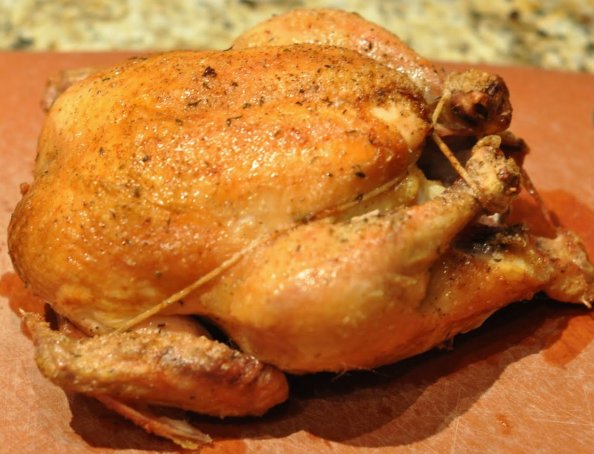We don’t roast chicken often enough. It’s a really easy and inexpensive way to get several meals out of one protein. We have tried roasted chicken lots of different ways, but recently found the most simple way yet, that was also the most delicious we have tried so far. Rather than stuffing the cavity with anything, applying a rub to the outer skin, or adding compound butter under the skin (all methods we have tried in the past), we just trussed the chicken, generously seasoned it with dried thyme, salt & pepper and roasted it in a cast-iron skillet in the oven. Seriously simple, and super delicious.
The first step in roasting the chicken is to clean out the cavity and rinse the chicken inside and out. Then pat it dry really well with paper towels.
The next step is to truss the chicken. This step is not totally necessary, but simply holds the chicken together while it is roasting, helps the chicken to cook more evenly and makes it look pretty when it’s done. To truss the chicken, you need kitchen twine, which you can probably find in the kitchen supply section of your grocery store. A single roll lasts a really long time.
If you do an online search for “how to truss a chicken,” you will get many many different methods, in all ranges of complexity. Dan did some research and came up with what we think is a pretty simple way to do it. First, take the wings and turn them in and around such that the thin outer cartilage part rests against the upper breast part.
My highly technical description of wing placement, pictured from another angle.
Once the wings are tucked in, place the chicken back on the plate, breast side up.
Take a long piece of twine and place it across the back of the chicken’s shoulders and against each wing, and then pull the twine back toward the, um, back of the chicken.
Pull the twine taut and tie each piece together like you are tying a bow (without actually tying the bow).
Next, wrap the loose ends of the twine around the base of each leg bone a couple of times.
Then pull the legs together and tie the twine ends into a knot.
Trussed chicken (Possibly the least-flattering view, sorry. Also photographic evidence that we did not put anything in the cavity. Again, sorry for the view).
Place the chicken in a cast-iron skillet and season generously with salt and pepper (we use kosher salt). Then put the skillet in the oven pre-heated to 450 degrees and roast it for 45-60 minutes.
Despite Dan’s strict orders to not open the oven door while the chicken was roasting, I managed to get a quick (unfocused) shot.
When the chicken is done, take it out, add a teaspoon or so of dried thyme to the accumulated juices in the skillet, and spoon some of the juices over the chicken.
In a strong, bold move, Dan decided to use the same spoon he used to baste the chicken as a tool to move it from the skillet to the cutting board by inserting the spoon into the cavity (jeez – how many more times can I say “cavity” in this post – apologies to our vegetarian friends) and lifting it out of the skillet.
Success! (Please note that FoodieLawyer does not endorse or recommend this method of removing molten hot roasted poultry – dripping with equally hot juices – from even hotter cooking receptacles, particularly with regard to your Thanksgiving turkey).
Beautiful bird. Allow the chicken to rest for 10-15 minutes. Cut off the twine and carve it up.
The whole roasted chicken yields a lot of meat to be used in other recipes, sliced up for a sandwich, or just eaten as leftovers. A tip we picked up from Chef Thomas Keller is that roasted chicken (hot or cold) is delicious dipped in dijon mustard.
On this night, we served the roasted chicken with sauteed zucchini and lemon pasta. So good! And stay tuned for the post about how we transmogrified the leftover chicken…
